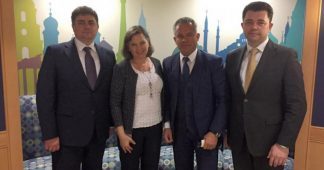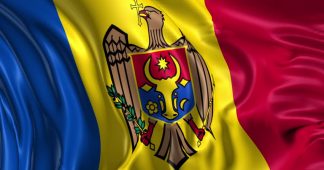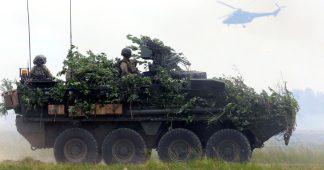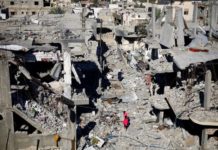Moldova Embraces NATO: Fools Rush In Where Angels Fear to Tread
23.02.2018
Moldova appears to be rushing to embrace NATO. According to the statement of Defense Minister Eugen Sturza, the country’s armed forces will be rearmed to meet NATO standards. In an interview with Moldova-1 TV channel, he said Moldova will buy lethal weapons and ammunition abroad for the first time in 27 years. The republic is to receive €11 million in military aid from the United States. According to the official, it’s just a beginning. The rearmament and modernization process will go much further as the military prepares for taking part in international missions.
The mention of the need to meet NATO standards (whatever it means) was done on purpose. It was a policy statement as the Moldovan government is shifting from neutrality to ally itself with the West. Moldova is a member of the NATO’s Partnership for Peace program. It has participated in the bloc’s mission in Kosovo.
On Feb.5, Romanian Minister of Defense, Mihai Fifor visited Moldova to meet his counterpart. Joint projects to move Chisinau closer to NATO topped the agenda. The two officials reached an agreement on formation of a joint battalion trained to respond to emergencies. The move is taken to familiarize Moldova’s military personnel with NATO’s procedures. It was announced that 41 Moldovan servicemen will go through training in Romania this year. Some 800 Moldovan soldiers have already been trained there.
The Romanian Defense Chief said Bucharest wishes for Republic of Moldova’s European track to become an irreversible process. In December, 2017, the NATO Liaison Office was opened in Chisinau to confirm the fact that Moldova has become a springboard for NATO information offensive. Last May, Moldova expelled five Russian diplomats. Just a few days ago a law banning Russia broadcasting in Moldova came into force. The country has joined NATO anti-Russia propaganda effort.
Not much has been said about it but the US Navy plans to construct eight training facilities for military operations in the Bulboaca training base. Probably, the facility will host American Marines. Last March, US Army Commander in Europe Lt. Gen. Ben Hodges, said US seeks “ways to do more exercises in the southern flank of NATO”. In the summer of 2017, Bulboaca hosted the Dragoon Pioneer 2017, a joint US-Moldovan exercise.
Romanian Prime Minister Viorica Danchila will visit Chisinau on February 27 after her trip to European institutions. New moves to strengthen security cooperation with NATO via Romania are expected. Moldova’s ruling coalition will seek to limit Russia’s influence, said Daniel Coates, the US Director of National Intelligence, at the hearings in the special committee on intelligence of the US Congress Senate held on Feb.13.
On Feb.12, the Moldova’s Defense Ministry announced that the military would join the US, Bulgaria, Romania, Ukraine and Georgia in Platinum Eagle, a large-scale military exercise. The mission is to deploy joint forces under unfavorable battle conditions.
Speaking at the Munich Security Conference, Moldova’s Prime Minister Pavel Filip used the opportunity to call for withdrawal of Russian troops from Transnistria. Speaker of the Moldovan parliament, Andrian Candu, says that the presence of Russian troops stationed on the left bank of the Dniester is illegal. According to him, they should be withdrawn with compensation paid by the Russian government for the damage supposedly inflicted by the “occupation forces”.
Last July, Moldova’s parliament passed a resolution urging the withdrawal of Russian military from Transnistria. The lawmakers for Socialist Party left the parliament in protest against it, while Moldavia’s President Igor Dodon called the move a provocation. The vote came a day after the Moldovan government refused to allow a military aircraft with Russia’s Deputy Prime Minister Rogozin on board to land in Chisinau. The official was to take part on the festivities devoted to the 25th anniversary of the Transnistria’s peacekeeping mission.
The authorities of the breakaway republic oppose such a move. They say the Russian military presence guarantees peace. The Russian-speaking region of Transnistria separated from Moldova in 1991. An armed conflict broke out in 1992-1993. Russian peacekeepers put an end to the fighting. The 1,000-strong task force, including Russian, Transnistrian and Moldovan military assisted by a dozen of Ukrainian military observers, has been securing peace for about 26 years.
Roughly, 1,000 Russian servicemen guard the warehouses in Kolbasna (some 20,000 tons of ammunition). This presence is very limited and poses no threat to anybody but it ensures peace. Suppose Russian peacekeepers leave, is there any OSCE member willing to contribute its forces? Can anybody guarantee no armed conflict will spark again to take away human lives? It should be noted that the “5+2 format” talks on Transnistrian peace held since 2005 by Moldova, Transnistria, the OSCE, Russia, Ukraine as parties and the EU and the US in external observers’ roles have produced no results so far. No one of those who want Russia to go has ever come up with any ideas or initiatives to give fresh impetus to the process.
Should the situation in Transnistria become part of “the worse for Russia, the better for us” geopolitical game? What about the Transnistrian people? Who will protect their rights? So, Moldova can make one step after another to get closer to the North Atlantic Alliance, buy weapons from bloc’s members and host NATO’s facilities on its soil. But Russian peacekeepers cannot stay in Transnistria despite the fact that it is done in strict compliance with the international obligations (the 1992 Agreement on the Principles for a Peaceful Settlement of the Armed Conflict) and the wish of Transnistrian people and government.
Moldova seldom hits media headlines but the situation there is another example of creeping NATO expansion. The US is in the process of establishing its military presence there to make American soldiers and Russian peacekeepers watch each other through gun sights. It’s sad, because Russia and Moldova have never seen each other as adversaries. Moldova, a neutral state, will inevitably become a target for Russia’s potential retaliatory strike.
The situation can be changed before it is too late. Moldova holds parliamentary elections in November. A new parliament may adopt a more responsible foreign policy to put the relationship between Moscow and Chisinau back on track to benefit all.
Published at https://www.strategic-culture.org/news/2018/02/23/moldova-embraces-nato-fools-rush-where-angels-fear-tread.html
Also read











